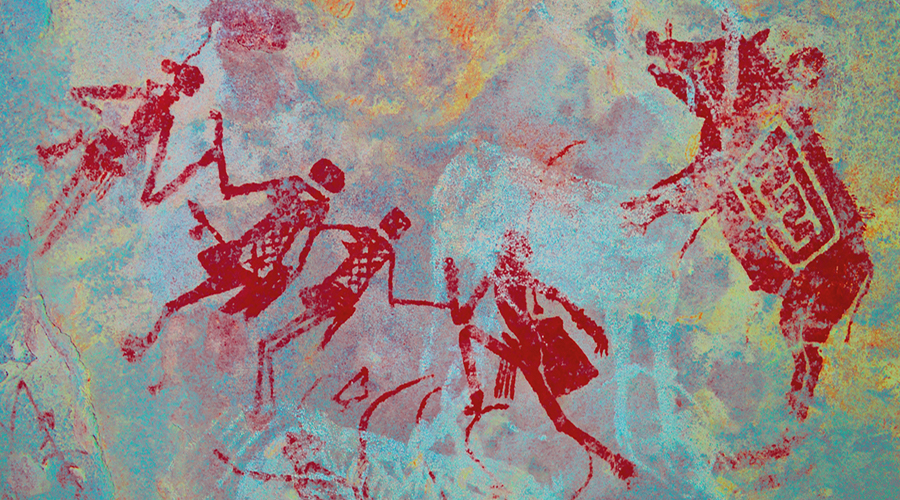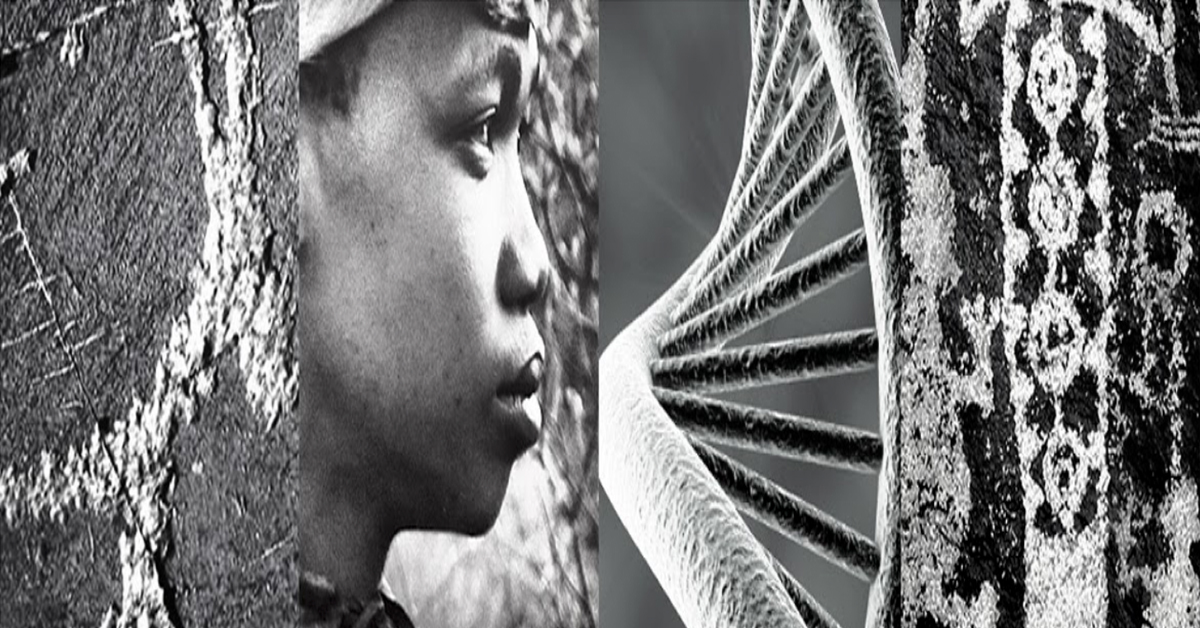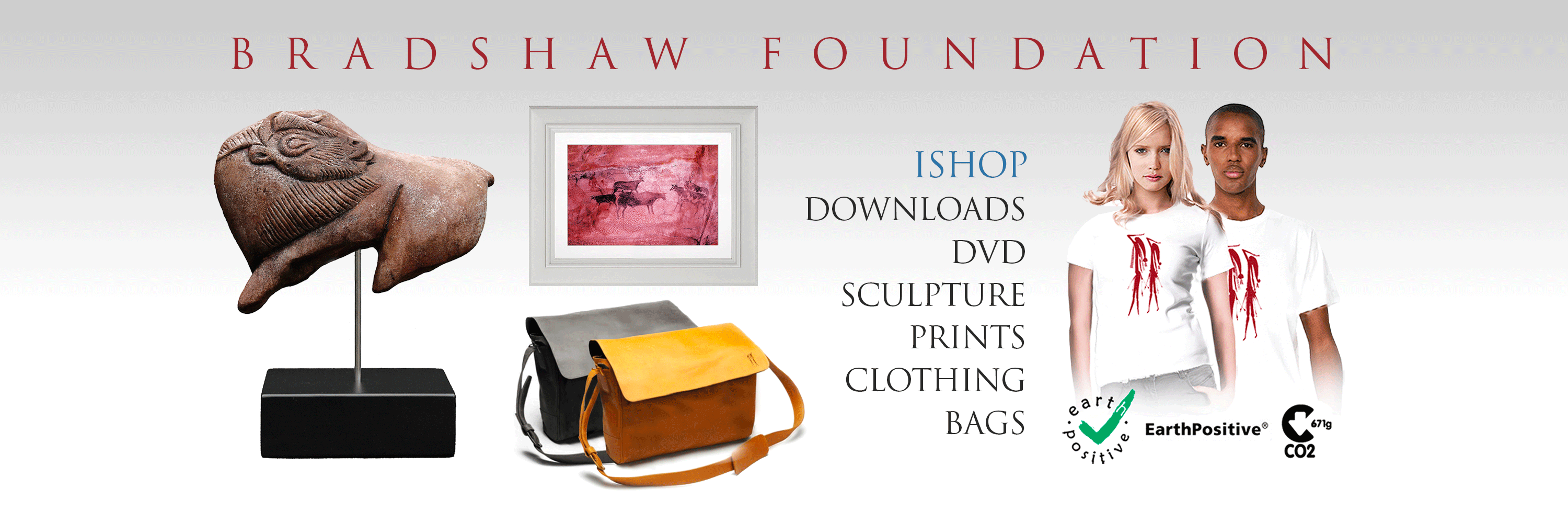


An article by Jonathan Amos BBC Science Correspondent - Rock shelter used by speedy early Australians - reports on the speed at which the first Aboriginal settlers spread across Australia has been underlined by the discovery of an ancient rock shelter north of Adelaide.
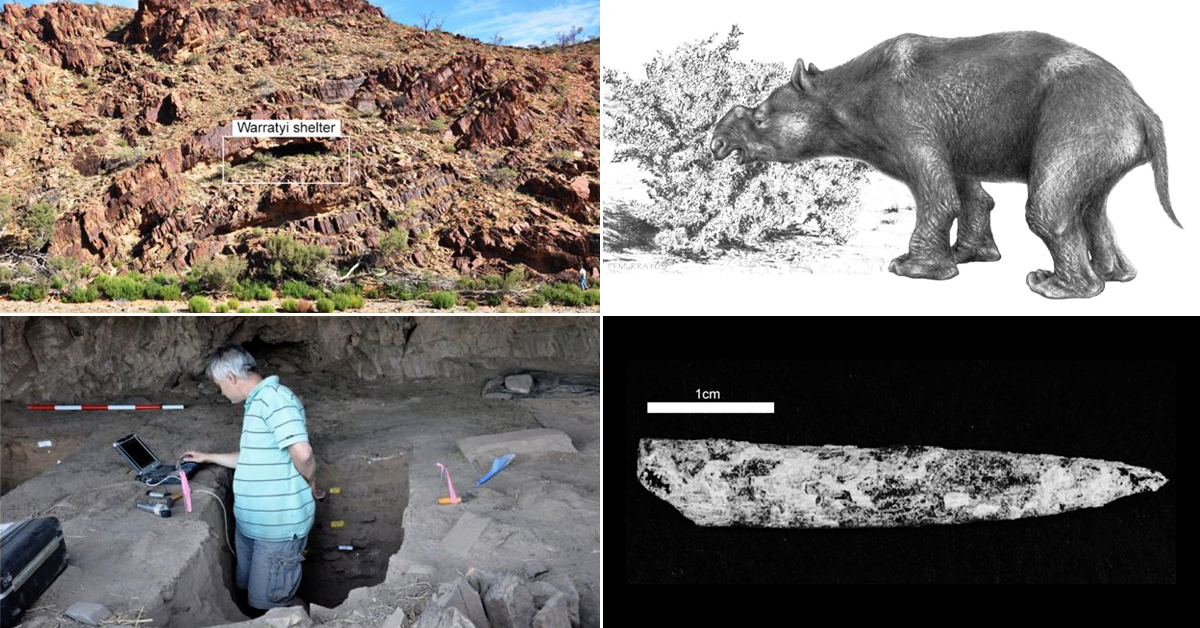
The Warratyi rock shelter located in the Flinders Ranges. The Diprotodon, the size of a hippo, was the largest marsupial that ever lived. The sharpened bone point, dated to be 38,000-40,000 years old, is now the oldest bone tool yet found in Australia. Dating in the shelter. Images (top left clockwise): Giles Hamm, Peter Murray, Giles Hamm & Lee Arnold.
Oldest bone & #StoneTools discovered in #ancient rock shelter reveal speed of people spreading across #Australia https://t.co/lFHcVobeCg pic.twitter.com/HHb9mdjOSV
— Bradshaw Foundation (@BradshawFND) November 3, 2016
The Warratyi rock shelter located in the Flinders Ranges has revealed tools and other artefacts that date back to around 49,000 years ago, as reported in the journal Nature. This suggests Aboriginal people colonised large parts of the continent within a few millennia of their arrival.
Lead scientist Giles Hamm states that it is the oldest southernmost site on the continent. Another site in south-western Australia known as Devil's Lair is also significant, but in terms of inland occupation, the Warratyi rock shelter is important geographically because it shows people are moving very quickly around the continent and into the interior part of the continent. Indeed, this shelter is 10,000 years older than anything else discovered so far.
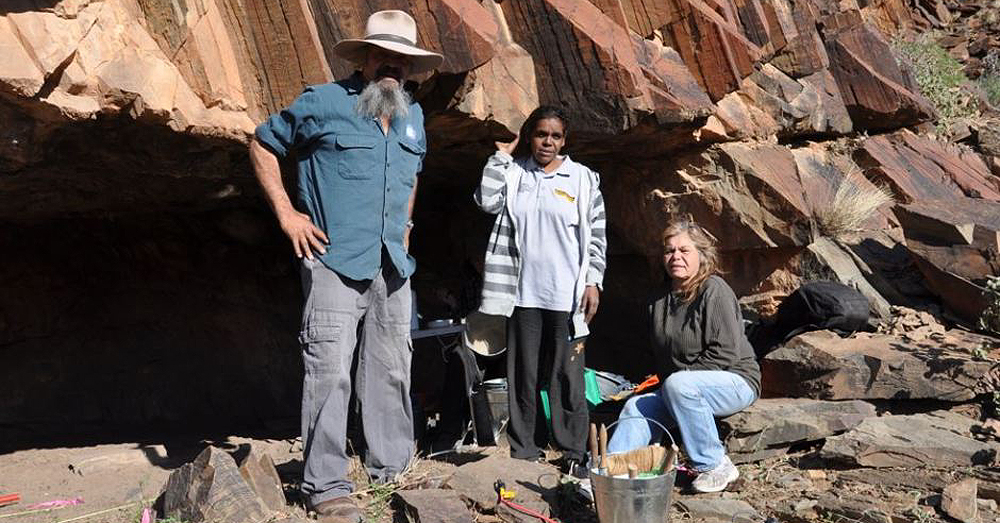
Co-authors Clifford Coulthard and Sophia Wilton with Christine Coulthard of the Adnyamathanha Traditional Lands Association. Image: Giles Hamm
Clifford Coulthard of the Adnyamathanha Traditional Lands Association, who found the shelter while working alongside Mr Hamm, states that this has not been a surprise. "A lot of the old people said we were here a long time ago. We're all happy about it."
Dating of the sediments and objects in the cave, which include tools, animal bones, charcoal, ash, egg shells and plant material, reveal that humans used the site sporadically over millennia - periods of frequent use interspersed with periods of abandonment. Among the finds are examples of the oldest bone and stone tools in Australia. This pushes back significantly the dates for the development and use of some of these key technologies. The shelter also revealed significant amounts of red ochre, determined to be between 49,000 and 46,000 years old. Ochre is not a local geological resource and must have been imported.
The shelter also revealed a bone specimen from the biggest marsupial that ever lived, the wombat-like creature Diprotodon optatum, and egg shells from the huge flightless bird Genyornis newtoni. This suggests that Warratyi's ancient residents were hunting the local megafauna.
Another team-member, Dr Lee Arnold, emphasized the importance of dating at the Warratyi shelter. In some cases in the past, there has not been enough preservation of materials that are needed to use widely applicable techniques such as radiocarbon dating and optically stimulated luminescence dating. The artefacts of this age are quite close to the limit of radiocarbon dating.
View the Journey of Mankind Genetic Map and read about humankind's global migration:
http://www.bradshawfoundation.com/stephenoppenheimer/index.php
View the rock art in the Australian Rock Art Archive:
by Bradshaw Foundation
Monday 04 December 2023
by Bradshaw Foundation
Friday 30 June 2023
by Bradshaw Foundation
Thursday 06 April 2023
by Bradshaw Foundation
Thursday 24 November 2022
by Bradshaw Foundation
Tuesday 27 September 2022
by Bradshaw Foundation
Thursday 08 September 2022
by Bradshaw Foundation
Tuesday 19 July 2022
by Bradshaw Foundation
Monday 06 June 2022
by Bradshaw Foundation
Friday 11 March 2022
by Bradshaw Foundation
Wednesday 02 March 2022
by Bradshaw Foundation
Thursday 26 August 2021
by Bradshaw Foundation
Monday 16 August 2021
by Bradshaw Foundation
Tuesday 06 July 2021
by Bradshaw Foundation
Thursday 06 May 2021
by Bradshaw Foundation
Thursday 06 May 2021
by Bradshaw Foundation
Tuesday 16 March 2021
by Bradshaw Foundation
Monday 04 December 2023
by Bradshaw Foundation
Friday 30 June 2023
by Bradshaw Foundation
Thursday 06 April 2023
by Bradshaw Foundation
Thursday 24 November 2022
by Bradshaw Foundation
Tuesday 27 September 2022
by Bradshaw Foundation
Thursday 08 September 2022
by Bradshaw Foundation
Tuesday 19 July 2022
by Bradshaw Foundation
Monday 06 June 2022
by Bradshaw Foundation
Friday 11 March 2022
by Bradshaw Foundation
Wednesday 02 March 2022
by Bradshaw Foundation
Thursday 26 August 2021
by Bradshaw Foundation
Monday 16 August 2021
by Bradshaw Foundation
Tuesday 06 July 2021
by Bradshaw Foundation
Thursday 06 May 2021
by Bradshaw Foundation
Thursday 06 May 2021
by Bradshaw Foundation
Tuesday 16 March 2021
Friend of the Foundation
